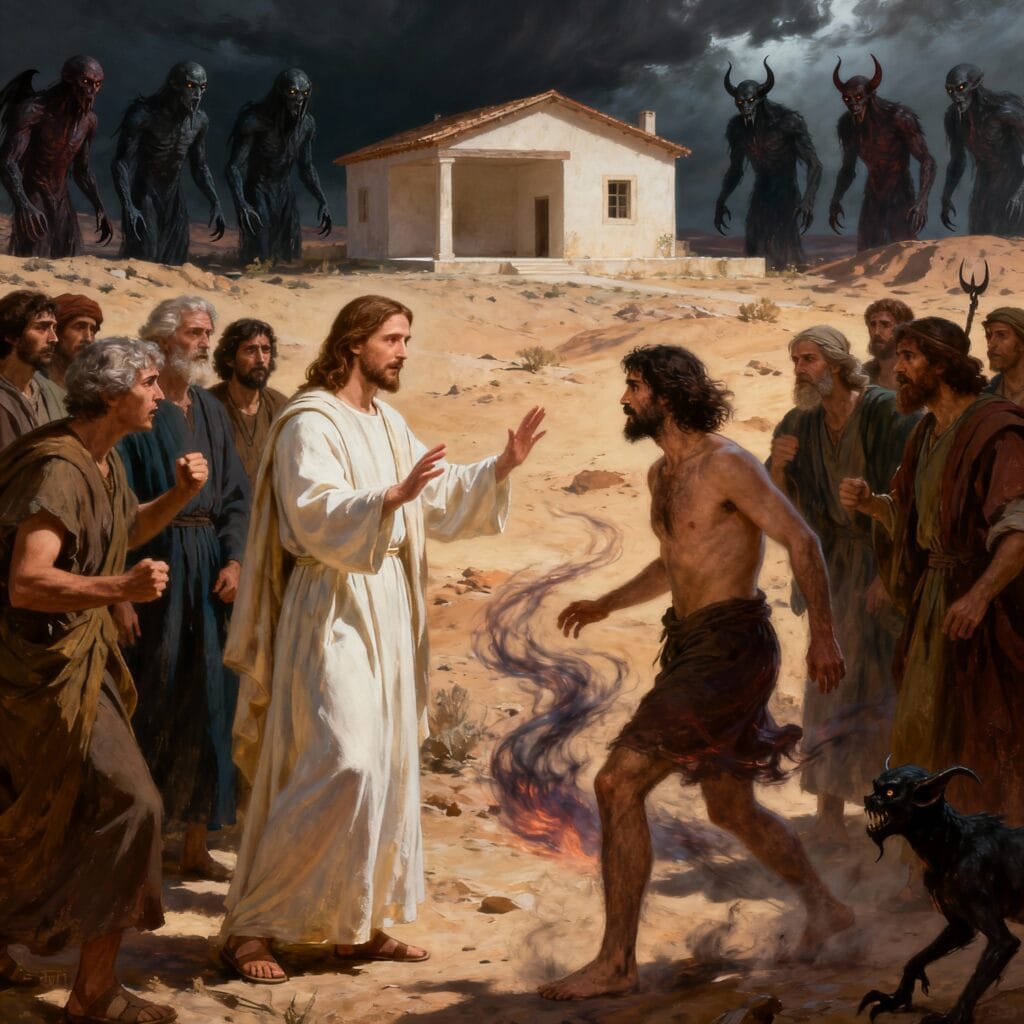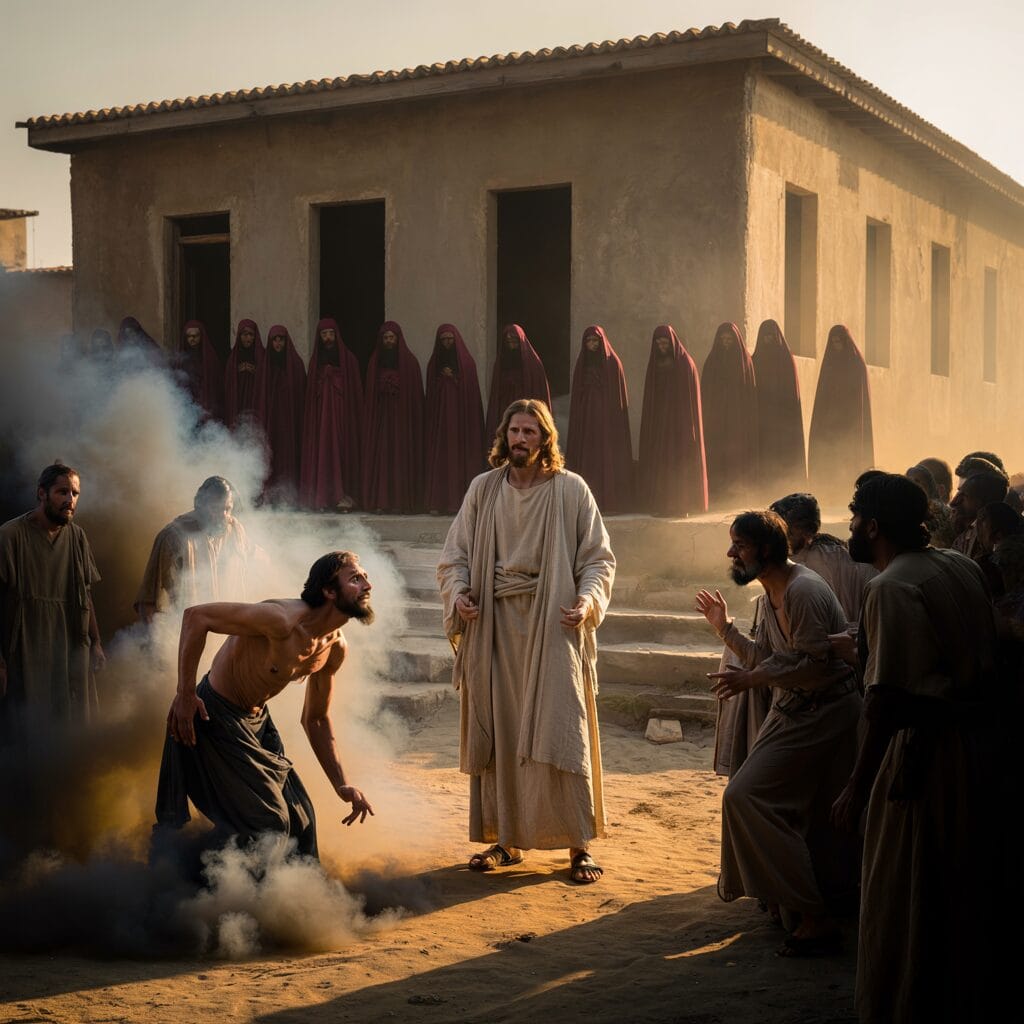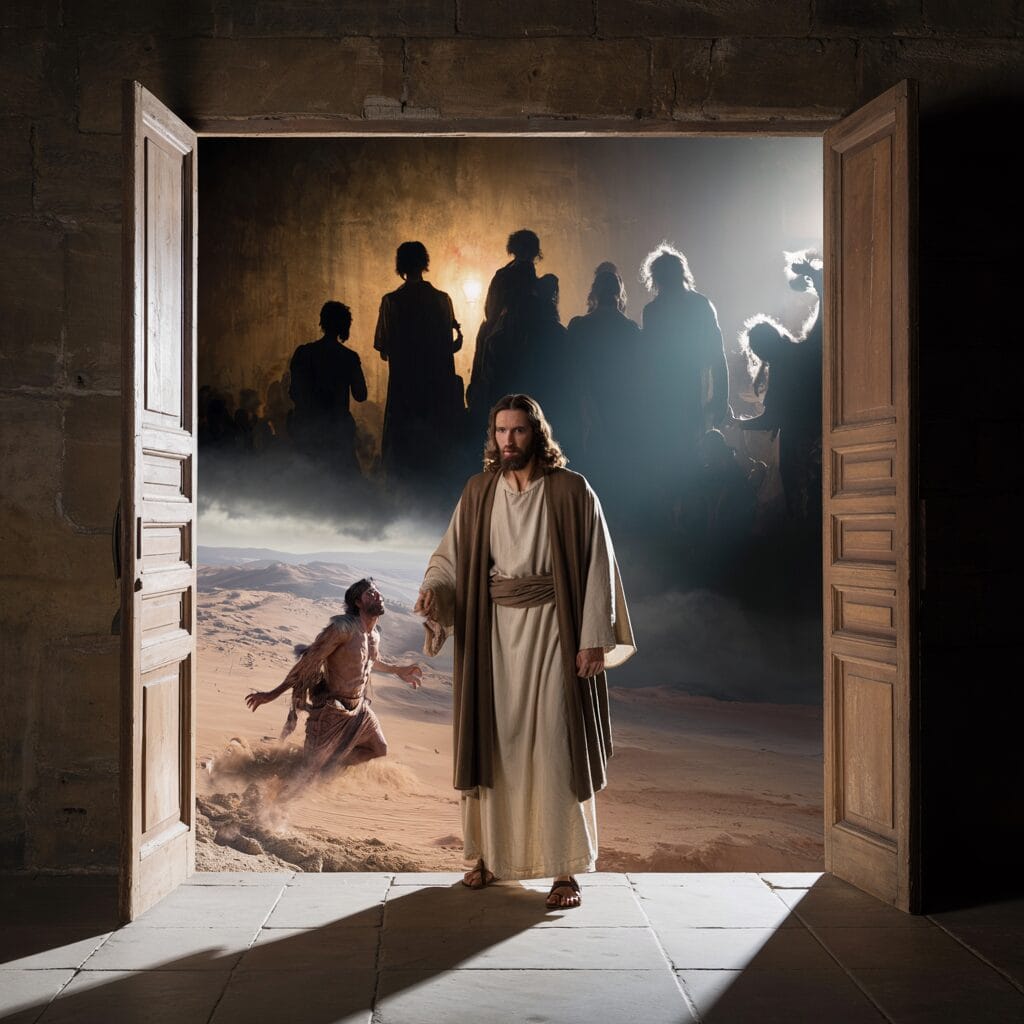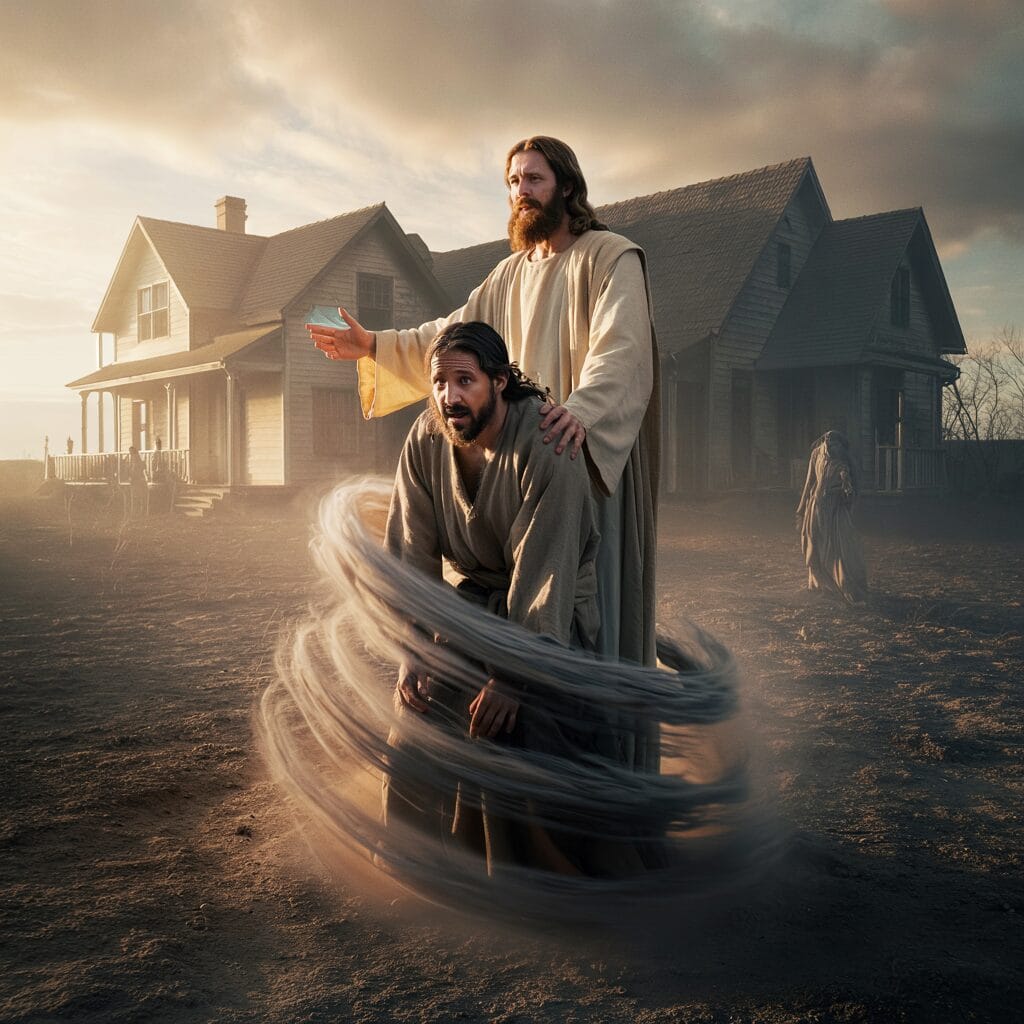At that time,
as Jesus had expelled a demon,
some said:
“It is by Beelzebub, the prince of the demons,
that he casts out demons.
Others, to test him,
were seeking a sign from him from heaven.
Jesus, knowing their thoughts, said to them:
“Every kingdom divided against itself becomes desolate,
its houses are collapsing one on top of the other.
If Satan also is divided against himself,
How will his kingdom stand?
You say indeed that it is by Beelzebub
that I expel the demons.
But if I drive them out by Beelzebub,
Your disciples, by whom do they expel them?
From then on, they themselves will be your judges.
On the other hand, if it is by the finger of God
that I expel the demons,
so the kingdom of God has come upon you.
When the strong man, well armed, guards his palace,
everything that belongs to him is safe.
But if a stronger one comes and triumphs over him,
he takes away his weaponry which he trusted,
and he distributes everything he has stripped him of.
He who is not with me is against me;
He who does not gather with me scatters.
When the unclean spirit has gone out of the man,
he travels through arid places
looking for somewhere to rest.
And he doesn't find it. So he says to himself:
“I will return to my house,
where I came from.”
When he arrived, he found it swept and tidy.
So he goes away,
and he takes other spirits even worse than himself,
seven in number;
They come in and settle down.
So the state of this man
is worse at the end than at the beginning."
– Let us acclaim the Word of God.
Gospel of Jesus Christ according to Saint Luke
The account in Luke 11:15–26 presents us with a heated conversation: Jesus has just cast out a demon, and his opponents accuse him of acting by the power of Beelzebub. Jesus responds by pointing out the contradiction of a “divided kingdom” and proclaiming that his action—“by the finger of God”—attests that God’s reign is already present. He then offers two powerful images: that of the strong and the strongest, and that of the cleansed house to which the unclean spirit returns and brings seven others, only to end up in a worse state than at the beginning.
Transposed to our times, this text questions us on several levels: how can we discern the signs of God's presence? How can we respond to accusations and resistance? What is the spiritual dynamic of conversion and relapse? And finally, what call does this passage make to us for community and personal life today?
Context and explanation of the text
The Gospel Context and Jesus' Argument
Luke places this episode in a context of tension: Jesus performs signs of healing and exorcism, attracting attention and controversy. Accusing Jesus of serving Beelzebub is an attempt to neutralize his words and discredit his actions. Jesus responds with simple logic: if Satan is divided against himself, his power crumbles. The argument appeals to common sense: a leader who divides his own camp loses it.
"By the finger of God"
The expression "finger of God" is rich in biblical imagery (cf. Exodus 8:19: the magicians who recognize the power of God; Psalm 8; Daniel). To say that Jesus expels demons "by the finger of God" affirms not only that his power is divine, but also that the reign of God has begun to manifest itself concretely. It is not just a miracle-working power, but the inauguration of a new reality: the coming of the kingdom.
The "strongest" and the house cleaned
The metaphor of the strong and the strongest underlines Christ's superiority over the forces of evil: he disarms what held man captive. The second image—a house swept clean and empty, then invaded by worse spirits—speaks of superficial conversion: if one is content with a simple cleaning without inhabiting the house with the love of God, one runs the risk of a worse relapse than before. It is a warning against religious formalism and the illusion of external purification without interior transformation.

Putting it into perspective: the meaning for today
Accusations and the deconstruction of signs
Today, as yesterday, people and institutions that proclaim good and do good can be accused, ridiculed, or co-opted. The digital age intensifies these reactions: rumors, slander, fake news, conspiracy theories. Jesus shows us the method: respond with truthful actions and consistency, rather than personal attacks. He also teaches us that recognition of God's presence is earned through the consistency of concrete signs: compassion, healing (in the broad sense), justice.
The “finger of God” and contemporary signs of the Kingdom
The "finger of God" today is manifested in often humble gestures: solidarity, commitment to justice, support for marginalized people, symbolic healings (reconciliation, peace restored). Recognizing these signs requires spiritual and critical attention: differentiating sincere wonder from a flattering spectacle. The kingdom is measured less by great performances than by the capacity to make those who are oppressed close, free, and dignified.
The risk of the “empty house”
The passage warns against a faith purged of living content. In our age, when spirituality can become commodified or individualistic, when religious practices are sometimes reduced to aesthetic routines, the temptation of a lifeless “clean interior” is real. A “swept and tidied” but empty spiritual house can be occupied by ideologies, addictions, violent behaviors, or a consumerism that fills the inner void. Authentic faith involves inviting the Spirit, engaging in a living community, and receiving practices that transform the heart—prayer, Eucharist, confession, charity.
Practical applications for personal and community life
Discerning Spirits
- Practice discernment: pray, fast, listen to the Word, seek advice from spiritually mature people. Discernment is not just an intellectual analysis; it is a spiritual practice that is strengthened by fidelity.
- Recognizing the Fruits: According to Matthew 7:16–20, a tree is judged by its fruits. Actions that spread peace, justice, and mercy confirm the presence of the Kingdom.
Avoiding the superficiality of conversion
- Living in the house: Ensure that conversion is not merely symbolic. Lasting change requires patient construction: prayer routines, spiritual direction, concrete commitments.
- Create support spaces: training, discussion groups, support for people freed from addictions or violence. A faith that accompanies helps prevent the "cleaned house" from being reoccupied by other "spirits."
Responding to accusations and divisions
- Respond with consistency: The best response to slander is faithful service and transparency. This does not preclude prudent wisdom (not entering into sterile conflicts).
- Combating polarization: Jesus reminds us that "whoever is not with me is against me." This phrase can be misunderstood if it justifies exclusion. In context, Jesus is talking about gathering; he is calling for a faithfulness that unites rather than disperses. In our communities, translating this requires a commitment that is both firm on what matters and humble in how we treat others.

The Question of Evil and Human Freedom
Understanding Evil Today
Evil manifests itself in new forms: systemic violence, dehumanization through technology, ecocide. The exorcism Jesus performs has symbolic significance: it announces that God opposes evil in all its forms. Christians are called to combat evil—not only on a personal level, but also on a social level: to defend human dignity, protect creation, and combat injustice.
Human freedom as a battlefield
The metaphor of the house reminds us that human freedom is often fragile. Structures of sin (poverty, inequality, oppression) can leave a person vulnerable. We must therefore work towards transformations that prevent the reoccupation of "home." This involves politics, education, and pastoral care.
Pastoral and liturgical paths
For preaching
- Highlight the way in which Jesus inaugurates the kingdom through concrete gestures.
- Emphasize community responsibility: welcoming, supporting, not just being content with a symbolic “clean-up.”
- Avoid sensationalism: place exorcism within a pastoral approach that heals, protects and educates.
For catechesis
- Offer modules on discernment, prayer, and the fight against contemporary temptations.
- Offer support programs after conversion (fraternal groups, retreats, volunteering).
For the sacramental life
- Value the Eucharist and reconciliation as places where the “home” is inhabited by Christ.
- Promote strong times of community prayer and intercession for vulnerable people.
Contemporary testimonies
- A welcoming community for people in reintegration: it shows how social "cleansing" (housing, support) without spiritual integration can remain fragile; comprehensive support (faith, work, relationships) allows for lasting transformation.
- Pacification projects in conflict-ridden neighborhoods: by working on dignity and social ties, we “disarm” the factors of violence, as the “strongest” does in the parable.
- Youth movements committed to ecology: they embody the “finger of God” when they defend creation, climate justice and change consumption habits.

Dangers and Recoveries
- Reclamation of spiritual language to justify violence: the cry “I am with you” must not be used to exclude or oppress.
- Spiritual sensationalism: seeking miracles and signs at the expense of daily commitment against injustice.
- Spiritual individualism: believing that inner “cleansing” is sufficient without social conversion work.
- An ethics of presence
Luke 11 invites us to an ethic: to be present in a way that brings us together, that liberates, that builds. This implies:
- The daily practice of mercy;
- The courage of justice;
- Perseverance in prayer and community.
Words for Prayer
Here are several prayers, adapted for different times: personal prayer, community prayer, prayer for the fragile.
Prayer for Discernment
Lord Jesus, you who know hearts, grant me the spirit of discernment. May I recognize your presence and not be fooled by the forces that divide. Help me to recognize the fruits of your Kingdom and to walk in faithfulness. Amen.
Prayer for those suffering from the grip
God of tenderness, you see people trapped by addictions, violence, and fears. Come and dwell in their hearts, overthrow the powers that enslave them, give them brothers and sisters to accompany them, and transform the home of their lives into a place of peace. Through Jesus Christ. Amen.
Prayer for the community
Holy Spirit, builder of unity, teach us to gather and not to disperse. May our words and actions be signs of the coming kingdom, and may our community be a home where people welcome, repair, and live. Give us the strength to be “with” Christ, so that, united, we may be a source of healing. Amen.
Prayer for social commitment
Lord, master of the human heart, awaken in us the will to repair unjust structures. Make our hands instruments of peace, our minds tools of justice, and our lives an offering for the dignity of all. May your kingdom come through our service. Amen.
Prayer for lasting conversion
Lord Jesus, you have cast out demons and inaugurated your kingdom. Do not allow our lives to be emptied and reoccupied with greater evils. Come and dwell in us through your Spirit, grant us the discipline of prayer, the strength of community, and the grace of a transforming commitment. Amen.
A final pastoral reading
Luke's text reminds us that the coming of the kingdom is not a one-off or merely spectacular event: it is a continuous movement that disarms evil, frees captives, and builds meaningful lives. Today, the Gospel calls us to recognize these signs—often discreet—and to actively participate in the transformation of the world.
Concretely:
- Let us be attentive to people who bear witness to authentic liberation;
- Let’s invest in support that sustains conversions;
- Let us reject languages that divide and cultivate those that unite;
- Let us commit ourselves to justice and the protection of creation, places where the reign of God takes shape.
Hope and responsibility
The "finger of God" has acted in the past and acts today, sometimes in surprisingly ordinary ways. It is up to us to recognize the presence of the kingdom and to take part in it: through our gestures of mercy, our struggles for justice, our fidelity to prayer and to community. Let us ensure that our "houses" do not remain empty after a superficial cleaning, but that they are inhabited by the Spirit and by service to others.



